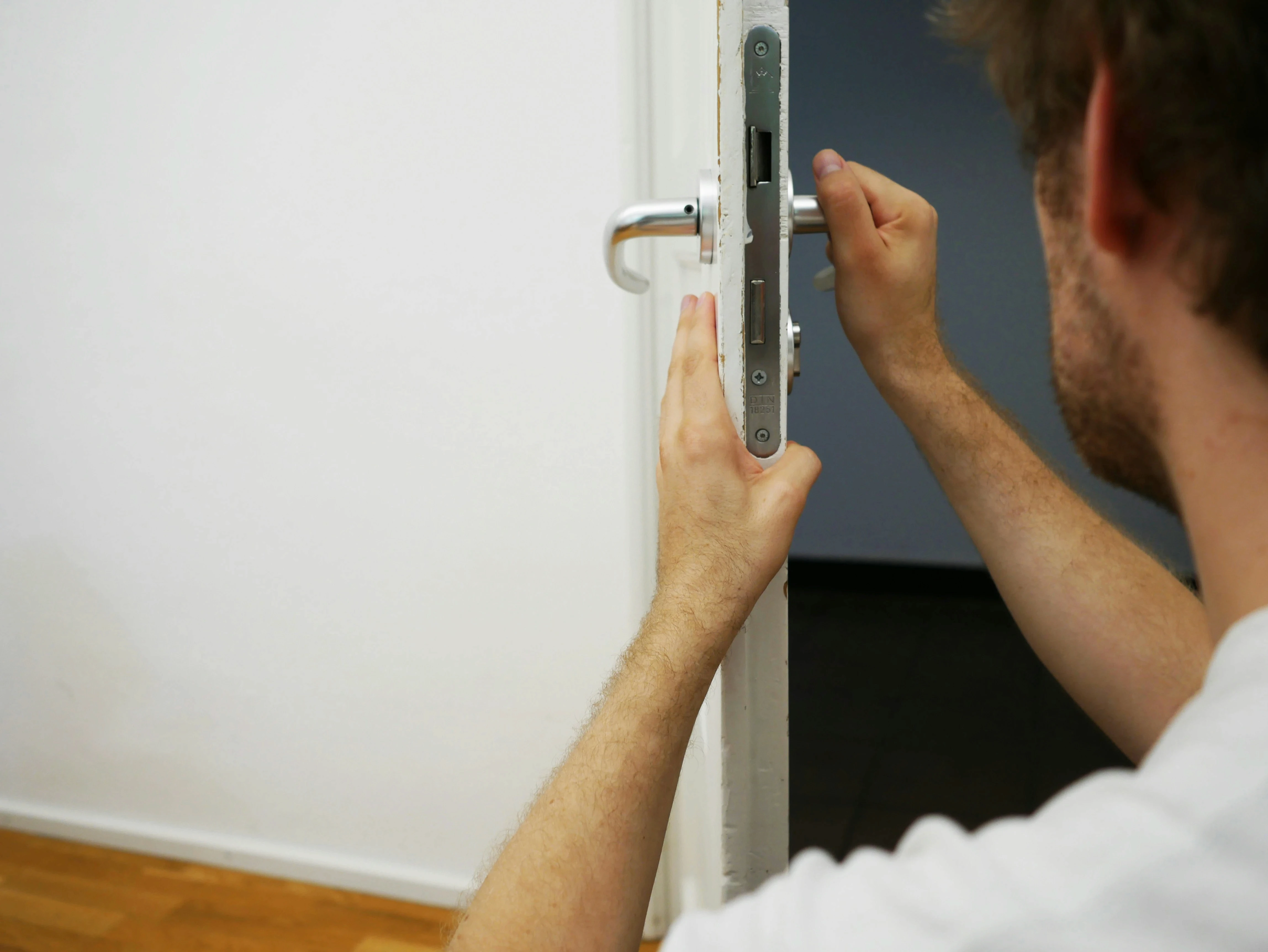What to Do If You're Locked Out of Your Apartment in Ontario
2 janv. 2025
Written by
Written by
Brianna Harrison (Credit Card & Travel Writer)
Brianna Harrison (Credit Card & Travel Writer)


Table of contents
Title
Title
Title
Have you ever been locked out of your apartment, unsure what to do next? We hope that since you’re here, this has not happened to you–but if it ever does, rest assured–we’re here to help.
Whether a mistake or a misunderstanding, getting locked out can be very frustrating (speaking from personal experience). But knowing your options and rights as a tenant can make a big difference.
In this article, we’ll walk you through the two types of lockouts you might face: illegal lockouts (your landlord has locked you out) and accidental lockouts (you may have misplaced your keys or left them inside), and what to do if you ever find yourself in either scenario.
Looking for more info on your rights as a tenant? These articles cover your basic rights about rent increases, evictions, and other important info:
Illegal Lockouts
What is an Illegal Lockout?
If your landlord or the management company prevents you from entering your home, usually by changing the locks and not giving you the replacement key, this is an illegal lockout. Landlords can never do this, even if they are trying to evict you.
Under the Residential Tenancies Act (RTA), the only way to legally evict you is to get an eviction order from the Landlord Tenant Board (LTB). If approved, the Sheriff can have you removed from the rental unit and get the locks changed if you don’t leave. But this will only happen if you don’t cooperate, and it must be done through the LTB, Court, and Sheriff.
Read more about your rights as a tenant and what your landlord can and cannot legally do if they are trying to evict you here.
What to Do If Your Landlord Illegally Locks You Out in Ontario
If your landlord has illegally locked you out, here are five things you can do right away:
1. Talk to your landlord: If they are reachable and willing to talk, ask them for a new key and remind them that locking you out is against the law.
2. Call the police: If your landlord is not cooperating and you need to get back into your apartment right away, call the police. They may be able to get your landlord to let you back in.
3. File a complaint: Call the Rental Housing Enforcement Unit at 416-585-7214 to explain your situation. They can call your landlord and explain the law, which might solve the problem. If your landlord does not cooperate, the Rental Housing Enforcement Unit may start an investigation, and your landlord may be taken to court.
4. Apply to the Landlord Tenant Board: File an application requesting an order to get your landlord to let you back into your unit. Use Form LTB T2.
5. Talk to a lawyer: If none of the steps above have worked, a lawyer can advise you on what to do. The LTB has legal resources here.
As a last resort, you can call a locksmith to break your lock and replace it with a new one. Keep in mind that you’ll need to provide proof that you live in the apartment, such as your ID with your name and address or lease agreement.
It can be quite expensive to break the lock and install a new one, especially if you call a locksmith after hours. Unfortunately, this might be your only option.
Keep the receipts, give your landlord a copy of the new key, and keep the old lock and evidence if you file a complaint with the LTB.

What if my landlord serves me with a notice to end tenancy (N-form)?
Any notices to end the tenancy, like non-payment of rent or interfering with other tenants, can be served to you, but they are not a reason for your landlord to change the lock and illegally lock you out.
Notices to end the tenancy are legally required to give you time to move out. They must have the reason, move-out date, and landlord’s signature (among other things). But just because your landlord wants to evict you, they cannot lock you out.
If the landlord locked me out, can I break in?
Breaking into your apartment after you’ve been locked out can be a tempting way to get back in, especially if you live on the ground floor and can break a window. It seems pretty simple, and you won’t have to call a locksmith, right? Wrong.
If you break a window, door, or anything else, you will likely be held liable for damaging the property. You are a renter, not an owner, so you can’t simply break in. If you’ve exhausted all other options and still can’t get back in, you’ll need to call a locksmith.
Yes, it can be expensive, but it’s your only option.
Do I still need to pay rent if I am locked out?
If your landlord is unresponsive or unreachable and you cannot enter your apartment, it might be tempting to withhold your rent payment. However, you cannot do this. It is illegal to withhold any part of the rent, even if you have been locked out.
Your landlord can issue an eviction order if you don't pay rent.
Accidental Lockouts
Your landlord locking you out of your apartment vs accidentally locking yourself out or losing your keys are two completely different situations. There’s no exact procedure to take in this case, but we recommend following these steps:
1. Call your landlord. Hopefully, they will be around and available to open your door. If they are out of town or unreachable (some landlords are notoriously difficult to reach, especially if it’s the weekend or a holiday!), move on to the second step.
2. Look at your lease agreement. If you cannot reach your landlord, check your lease for the procedure to follow in case of a lockout. Most leases will include a section on lockouts, lost or stolen keys, and what to do.

For example, this lease agreement outlines the procedure to follow if a tenant is locked out. During business hours, a staff member can unlock the door for a $50 fee. After business hours, the tenant must call a locksmith and pay for it out of their own pocket.
3. Call a locksmith. In most cases, if your landlord or property management company is unavailable and you need to access your apartment, the only thing you can do is call a locksmith. Depending on the situation and what’s outlined in your lease, you may or may not have to cover the full cost of the locksmith, plus the new lock and keys.
If you call a locksmith, keep all receipts and give your landlord a copy of the new key.
Remember when we said we have personal experience with being locked out? A while back, a member of our staff got locked out of their apartment. They tried to contact the landlord but were unavailable, so they called a locksmith who broke the lock and installed a new one. It ended up costing close to $300.
Moral of the story? Never misplace your keys. Better yet, give a copy to a close friend or family member who lives around the area.
We hope this helped, and we hope you never have to deal with being locked out of your apartment. But if it ever does, you’re now prepared with the info and key steps.
If you rent an apartment in Canada, use Chexy to earn rewards on your monthly rent payments. Using a credit or debit card, you can earn points or cashback while building your credit score.
Subscribe to our newsletter below for up-to-date credit card, travel, and rental content.
Have you ever been locked out of your apartment, unsure what to do next? We hope that since you’re here, this has not happened to you–but if it ever does, rest assured–we’re here to help.
Whether a mistake or a misunderstanding, getting locked out can be very frustrating (speaking from personal experience). But knowing your options and rights as a tenant can make a big difference.
In this article, we’ll walk you through the two types of lockouts you might face: illegal lockouts (your landlord has locked you out) and accidental lockouts (you may have misplaced your keys or left them inside), and what to do if you ever find yourself in either scenario.
Looking for more info on your rights as a tenant? These articles cover your basic rights about rent increases, evictions, and other important info:
Illegal Lockouts
What is an Illegal Lockout?
If your landlord or the management company prevents you from entering your home, usually by changing the locks and not giving you the replacement key, this is an illegal lockout. Landlords can never do this, even if they are trying to evict you.
Under the Residential Tenancies Act (RTA), the only way to legally evict you is to get an eviction order from the Landlord Tenant Board (LTB). If approved, the Sheriff can have you removed from the rental unit and get the locks changed if you don’t leave. But this will only happen if you don’t cooperate, and it must be done through the LTB, Court, and Sheriff.
Read more about your rights as a tenant and what your landlord can and cannot legally do if they are trying to evict you here.
What to Do If Your Landlord Illegally Locks You Out in Ontario
If your landlord has illegally locked you out, here are five things you can do right away:
1. Talk to your landlord: If they are reachable and willing to talk, ask them for a new key and remind them that locking you out is against the law.
2. Call the police: If your landlord is not cooperating and you need to get back into your apartment right away, call the police. They may be able to get your landlord to let you back in.
3. File a complaint: Call the Rental Housing Enforcement Unit at 416-585-7214 to explain your situation. They can call your landlord and explain the law, which might solve the problem. If your landlord does not cooperate, the Rental Housing Enforcement Unit may start an investigation, and your landlord may be taken to court.
4. Apply to the Landlord Tenant Board: File an application requesting an order to get your landlord to let you back into your unit. Use Form LTB T2.
5. Talk to a lawyer: If none of the steps above have worked, a lawyer can advise you on what to do. The LTB has legal resources here.
As a last resort, you can call a locksmith to break your lock and replace it with a new one. Keep in mind that you’ll need to provide proof that you live in the apartment, such as your ID with your name and address or lease agreement.
It can be quite expensive to break the lock and install a new one, especially if you call a locksmith after hours. Unfortunately, this might be your only option.
Keep the receipts, give your landlord a copy of the new key, and keep the old lock and evidence if you file a complaint with the LTB.

What if my landlord serves me with a notice to end tenancy (N-form)?
Any notices to end the tenancy, like non-payment of rent or interfering with other tenants, can be served to you, but they are not a reason for your landlord to change the lock and illegally lock you out.
Notices to end the tenancy are legally required to give you time to move out. They must have the reason, move-out date, and landlord’s signature (among other things). But just because your landlord wants to evict you, they cannot lock you out.
If the landlord locked me out, can I break in?
Breaking into your apartment after you’ve been locked out can be a tempting way to get back in, especially if you live on the ground floor and can break a window. It seems pretty simple, and you won’t have to call a locksmith, right? Wrong.
If you break a window, door, or anything else, you will likely be held liable for damaging the property. You are a renter, not an owner, so you can’t simply break in. If you’ve exhausted all other options and still can’t get back in, you’ll need to call a locksmith.
Yes, it can be expensive, but it’s your only option.
Do I still need to pay rent if I am locked out?
If your landlord is unresponsive or unreachable and you cannot enter your apartment, it might be tempting to withhold your rent payment. However, you cannot do this. It is illegal to withhold any part of the rent, even if you have been locked out.
Your landlord can issue an eviction order if you don't pay rent.
Accidental Lockouts
Your landlord locking you out of your apartment vs accidentally locking yourself out or losing your keys are two completely different situations. There’s no exact procedure to take in this case, but we recommend following these steps:
1. Call your landlord. Hopefully, they will be around and available to open your door. If they are out of town or unreachable (some landlords are notoriously difficult to reach, especially if it’s the weekend or a holiday!), move on to the second step.
2. Look at your lease agreement. If you cannot reach your landlord, check your lease for the procedure to follow in case of a lockout. Most leases will include a section on lockouts, lost or stolen keys, and what to do.

For example, this lease agreement outlines the procedure to follow if a tenant is locked out. During business hours, a staff member can unlock the door for a $50 fee. After business hours, the tenant must call a locksmith and pay for it out of their own pocket.
3. Call a locksmith. In most cases, if your landlord or property management company is unavailable and you need to access your apartment, the only thing you can do is call a locksmith. Depending on the situation and what’s outlined in your lease, you may or may not have to cover the full cost of the locksmith, plus the new lock and keys.
If you call a locksmith, keep all receipts and give your landlord a copy of the new key.
Remember when we said we have personal experience with being locked out? A while back, a member of our staff got locked out of their apartment. They tried to contact the landlord but were unavailable, so they called a locksmith who broke the lock and installed a new one. It ended up costing close to $300.
Moral of the story? Never misplace your keys. Better yet, give a copy to a close friend or family member who lives around the area.
We hope this helped, and we hope you never have to deal with being locked out of your apartment. But if it ever does, you’re now prepared with the info and key steps.
If you rent an apartment in Canada, use Chexy to earn rewards on your monthly rent payments. Using a credit or debit card, you can earn points or cashback while building your credit score.
Subscribe to our newsletter below for up-to-date credit card, travel, and rental content.

Try Chexy, No Strings Attached
Get rewards on your largest monthly expense starting this month. No fees, no stress, no catch.
Cancel anytime.
